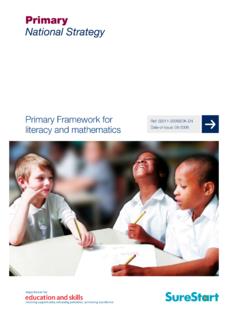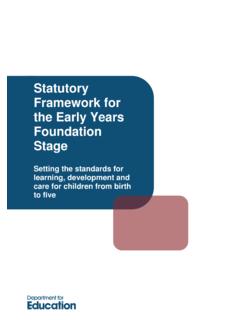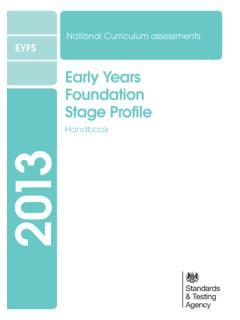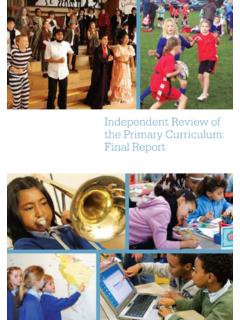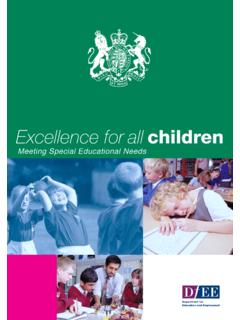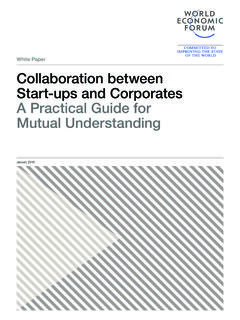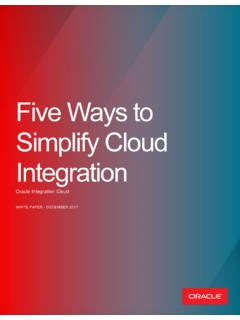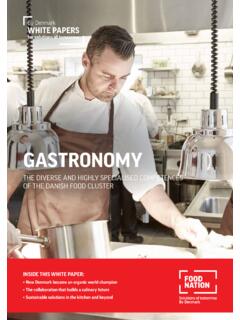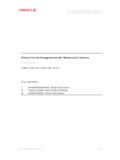Transcription of The Schools White Paper 2010 - educationengland.org.uk
1 The Importance of Teaching The Schools White Paper 2010. Department for Education The Importance of Teaching Presented to Parliament by the Secretary of State for Education by Command of Her Majesty November 2010. Cm 7980 Crown Copyright 2010. You may re-use this information (not including logos) free of charge in any format or medium, under the terms of the Open Government Licence. To view this licence, visit or write to the Information Policy Team, The National Archives, Kew, London TW9 4DU, or e-mail: Any enquiries regarding this publication should be sent to us at This publication is also available on ISBN: 9780101798020. Printed in the UK by The Stationery Office Limited on behalf of the Controller of Her Majesty's Stationery Office ID P002401441 11/10.
2 Printed on Paper containing 75% recycled fibre content minimum. 1. Contents Foreword by the Prime Minister and Deputy Prime Minister 3. Foreword by the Secretary of State for Education 6. Executive Summary 8. 1. Introduction the future of Schools 16. 2. Teaching and Leadership 19. 3. Behaviour 31. 4. Curriculum, Assessment and Qualifications 39. 5. New Schools System 50. 6. Accountability 65. 7. School Improvement 72. 8. School Funding 78. Endnotes 91. 2 The Importance of Teaching 3. Foreword by the Prime Minister and Deputy Prime Minister So much of the education debate in this country is backward looking: have standards fallen? Have exams got easier? These debates will continue, but what really matters is how we're doing compared with our international competitors.
3 That is what will define our economic growth and our country's future. The truth is, at the moment we are standing still while others race past. In the most recent OECD PISA survey in 2006 we fell from 4th in the world in the 2000. survey to 14th in science, 7th to 17th in literacy, and 8th to 24th in mathematics. The only way we can catch up, and have the world-class Schools our children deserve, is by learning the lessons of other countries' success. The first, and most important, lesson is that no education system can be better than the quality of its teachers. The most successful countries, from the Far East to Scandinavia, are those where teaching has the highest status as a profession; South Korea recruits from their top 5 per cent of graduates and Finland from the top 10 per cent.
4 There is no question that teaching standards have increased in this country in recent decades and that the current cohort of trainees is one of our best ever. But we have much further to go. We have already increased investment in the fantastic Teach First programme which will be doubled in size and train primary teachers for the first time. This White Paper goes much further in raising standards and giving outstanding Schools a much greater role in teacher training in the same way that our best hospitals train new doctors and nurses. Raising the status of teaching also requires a significant strengthening of teachers'. authority in the classroom. We know that among undergraduates considering teaching, fear of bad behaviour and violence is the most common reason for choosing an alternative career.
5 The measures contained in this White Paper to boost teachers' and head teachers' authority including new powers on detentions and searching will have a powerful impact. The second lesson of world class education systems is that they devolve as much power as possible to the front line, while retaining high levels of accountability. The OECD has shown that countries which give the most autonomy to head teachers and teachers are 4 The Importance of Teaching the ones that do best. Finland and South Korea the highest performing countries in PISA have clearly defined and challenging universal standards, along with individual school autonomy. In this country we have seen the success over the past two decades of the City Technology Colleges (CTCs) and then the Academies programme.
6 CTCs and former CTCs are now some of the best Schools in the country and children on free school meals who attend them do twice as well as the national average. Academies improved at GCSE level twice as fast as other Schools in 2008 and 2009. This week's Ofsted Annual Report confirms their success explaining that their freedoms allow them to innovate and ensure that educationalists can concentrate on education'. This White Paper , for the first time, offers these freedoms to all Schools in a way that encourages them to work with each other to improve. Our best Schools will able to convert directly to Academy status but will have to work with less successful Schools to help them improve. Other Schools will be able to become Academies by joining federations or chains.
7 Teachers, parents and charities will be able to open new Schools where there is a clear demand for something not offered at the moment. All Schools , whether they choose to become Academies or not, will see a massive reduction in the bureaucracy foisted on them in recent years. As the best education systems have shown, this power shift to the front line needs to be accompanied by a streamlined and effective accountability system. So we propose to re-focus Ofsted inspections on their original purpose teaching and learning and strengthen the performance measures we use to hold Schools accountable. The third lesson of the best education systems is that no country that wishes to be considered world class can afford to allow children from poorer families to fail as a matter of course.
8 For far too long we have tolerated the moral outrage of an accepted correlation between wealth and achievement at school; the soft bigotry of low expectations. Children on free school meals do significantly worse than their peers at every stage of their education. They are just half as likely to get good GCSEs as the average. More children from some private Schools go to Oxbridge than from the entire cohort of children on free school meals. This vast gap between rich and poor is not pre-ordained. In Finland and Canada the gap is much smaller. Even in this country there are some groups Chinese girls on free school meals for example who significantly outperform the national average. Of course Schools are not solely responsible for this problem.
9 In far too many communities there is a deeply embedded culture of low aspiration that is strongly tied to long-term unemployment. The Coalition Government's Work Programme and welfare reforms will help to tackle these issues. But Schools do have a crucial role to play. That is why the Pupil Premium lies at the heart of our reform programme: billion of extra money by 2014 15 that will follow poorer children directly to the school they attend. While we won't tell Schools how to spend this money, there will be clear transparency requirements to ensure it is spent on improving the life chances of our poorest young people. This White Paper signals a radical reform of our Schools . We have no choice but to be this radical if our ambition is to be world-class.
10 The most successful countries already Foreword by the Prime Minister and Deputy Prime Minister 5. combine a high status teaching profession; high levels of autonomy for Schools ; a comprehensive and effective accountability system and a strong sense of aspiration for all children, whatever their background. Tweaking things at the margins is not an option. Reforms on this scale are absolutely essential if our children are to get the education they deserve. David Cameron Nick Clegg Prime Minister Deputy Prime Minister 6 Foreword by the Secretary of State for Education Education reform is the great progressive cause of our times. It is only through reforming education that we can allow every child the chance to take their full and equal share in citizenship, shaping their own destiny, and becoming masters of their own fate.

